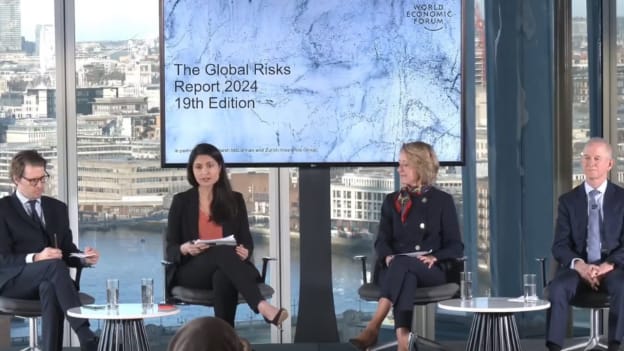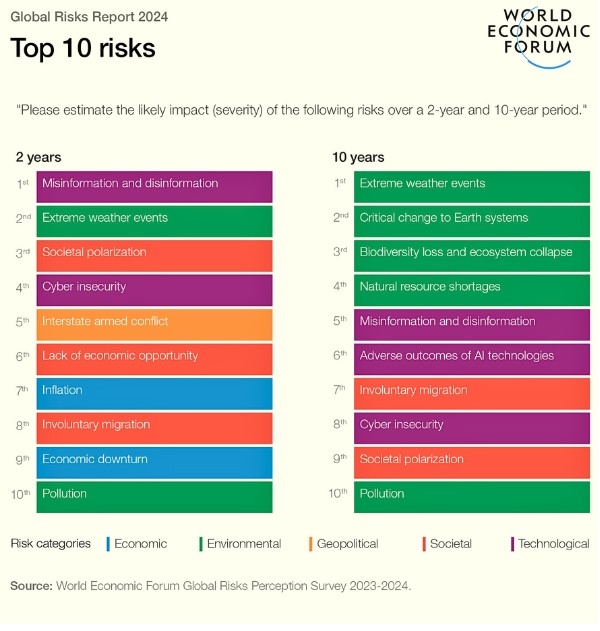World Economic Forum warns of rising global risks in 2024

World Economic Forum's Global Risks Report 2024 sounds a clarion call as a 'perfect storm' of technological, climate, and geopolitical threats brew on the horizon. The report pinpoints misinformation and disinformation as immediate threats, contrasting with long-term concerns surrounding extreme weather and critical Earth system changes. The report underscores a consensus among two-thirds of experts predicting a shift towards a multipolar or fragmented global order in the next decade
Unveiled this week preceding the WEF’s Davos summit, Saadia Zahidi, Managing Director of the World Economic Forum, said: "An unstable global order characterized by polarizing narratives and insecurity, the worsening impacts of extreme weather and economic uncertainty are causing accelerating risks to propagate."
The report, produced with Zurich Insurance Group and Marsh McLennan, surveyed over 1400 experts on the key global risks for the next 10 years. The results show a pessimistic outlook, with 30% expecting a high chance of global catastrophes in the next two years, rising to nearly two-thirds looking 10 years ahead.
"World leaders must come together to address short-term crises as well as lay the groundwork for a more resilient, sustainable, inclusive future," Zahidi urged.
Saadia Zahidi, WEF - We could be looking at the end of development, where current living standards get frozen because we don't have the incentives and resources for greater growth.
Disinformation dangers
The rise of AI-driven disinformation campaigns ranked as the top short-term global risk for 2024, driven by major elections in the US, India, and across Europe. The report warned that the spread of falsified information could undermine democratic processes and institutions.
"The nexus between falsified information and societal unrest will take centre stage amid elections in several major economies," the report stated. "Interstate armed conflict is a top five concern over the next two years."

Carolina Klint, Chief Commercial Officer for Marsh McLennan in Europe, echoed these concerns over the growing risks from AI models like ChatGPT which can easily generate disinformation. "It's no wonder that misinformation and disinformation is ranked as a top risk short term," she said.
Klint urged companies to take a proactive approach to cybersecurity as AI expands the tools available to threat actors. "We have to recognise that everything we use - water, electricity, finance, communications - depends on the integrity of complex computer systems," she emphasised.
Carolina Klint, Marsh - Unlocking AI's potential offers fantastic opportunities, yet businesses must tread wisely. Regular testing and active training are the keys to preventing strategic missteps and safeguarding against potential pitfalls.
Economic storm clouds
The report also highlighted economic risks over the next decade, with the potential divergence between developed and developing nations limiting progress on poverty reduction and sustainable development.
John Scott, Head of Sustainability Risk for Zurich Insurance Group, pointed to signs of progress on international cooperation such as the COP28 climate pact. But he warned more action is urgently needed. "We need to do a lot more in terms of widening and deepening and speeding up emissions reductions around the world," Scott said.
With inflation still ranking in the top 10 risks for 2024, Zahidi cautioned that the positive recent signs on inflation need to be balanced against ongoing geopolitical tensions that could trigger new shocks. She warned against complacency on economic risks.
"It's very possible that there's an additional shock or a high risk of miscalculation. So loosening policy too soon or too fast," Zahidi said.
Meanwhile, the report raised concerns that the lack of inclusive development could fuel political instability and unrest over the long term.
John Scott, Zurich Insurance - Choices around lower carbon diets, travel and electric vehicles, while small drops individually, can together move the needle on decarbonisation.
"Could we be looking at the end of development, where living standards get frozen at current levels?" the report asked. Limited economic opportunities and mobility may lock out segments of the population from progress.
Planet on the precipice
Environmental risks continue to dominate the long-term global risks landscape. The top three risks in the 10-year outlook were extreme weather events, critical planetary tipping points, and natural resource crises.
Carolina Klint likened the interconnected risks to "a big bowl of spaghetti." She called for more creative collaboration between governments and businesses to build resilience.
The report argues that new approaches are needed to global cooperation and governance at a time of increasing geopolitical competition. It recommends focusing cooperation on emerging technological risks like guidelines for AI in military decisions. But localization strategies are also key - from flood resilience to early warning systems.
"If we pull together all these approaches - local strategies, collaboration, international cooperation and individual action - we can move the needle on global risks," Scott concluded. But action from leaders, companies and citizens is urgently needed to chart a more resilient course.
Humanity clearly faces enormous challenges over the next decade. But with vision, unity and perseverance, a more sustainable and inclusive future remains within reach. The risks are real, but so is the opportunity to overcome them.
















